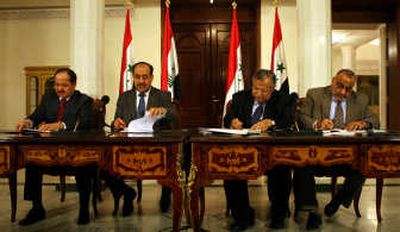Iraqis forge new coalition

BAGHDAD – As Iraqi politicians flew north on Thursday to survey the devastation in two villages ruined by bombings, Shiite and Kurdish political leaders in Baghdad announced the formation of a new alliance intended to begin mending the fractured government and defuse the forces behind such violence.
For weeks, politicians have discussed an alliance among the four leading Shiite and Kurdish parties, with the hope that marginalized Sunni factions would join the coalition. But politicians from the largest Sunni bloc in parliament said they would remain apart from the new group, asserting that the ruling Shiites still have not met their demands for greater participation. The Sunnis’ stance effectively undermines the coalition’s chances of breaking the political gridlock that has frustrated U.S. and Iraqi officials.
“We have lost hope, frankly, that this coalition will be the ideal solution to the strangling political crisis that the country is going through,” Abdul Kareem Samarrae, a Sunni lawmaker, said on al-Hurra television. “We hope that this is a genuine chance to solve those problems, but we think that this is merely a political cover for a government in its last few days or weeks.”
In northern Iraq, estimates of the death toll from the quadruple truck bombing Tuesday night in two remote villages near the Syrian border ranged from 250 to 500 people, ensuring its grim distinction as the deadliest single attack of the Iraq war. The villages were occupied largely by Yazidis, members of a small religious sect that combines elements of Zoroastrianism and other ancient religions. As workers continued to sift through the rubble of destroyed dirt huts to recover bodies, Iraqi officials toured the devastated villages and promised compensation to the families of the dead and wounded.
On the political front, Prime Minister Nouri al-Maliki of the Dawa party, alongside fellow Shiite Adel Abdul Mahdi, Iraq’s vice president and a leader of the Supreme Islamic Iraqi Council, announced the coalition at a news conference with two Kurdish leaders: Jalal Talabani, Iraq’s president, and Massoud Barzani, president of the Kurdish regional government. The leaders issued a three-page statement outlining such general and oft-stated goals as unifying and strengthening the government, building up Iraqi security forces and providing basic services.
“This is a step to motivate the political process, for we could not leave Iraq like this in a semi-paralyzed situation,” Talabani said. “We hoped that this movement would be wider, as I have told you, but we made great efforts with our brothers at the Iraqi Islamic Party,” he said, referring to a major Sunni Arab party.
Some Iraqi officials interpreted the new alliance as an attempt to manufacture a majority in parliament to help push through several pieces of stalled legislation. But with the Shiites and the Kurds already in close alignment, the announcement struck several observers as little real progress. The agreement also does not replace the current political blocs in parliament, but adds another layer of alliances to them.
“This is not the solution for Iraq’s problems,” said Hachim al-Hassani, a secular Sunni lawmaker, who said he planned to join the alliance despite his criticism of it. “The solution for Iraq’s problems is for the real parties to get together and agree on an agenda to fix Iraq’s problems.”